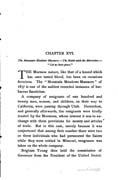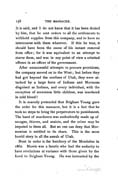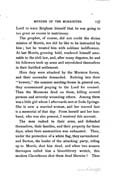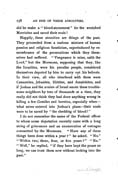
[p. 155]
CHAPTER XVI.
The Mountain Meadow: Massacre.—The Battle with the Morrisites.—"Let us have peace."
THE Mormon nature, like that of a hound which has once tasted blood, has been on occasions ferocious. The "Mountain Meadows Massacre" of 1857 is one of the saddest recorded instances of barbarous fanaticism.
A company of emigrants of one hundred and twenty men, women, and children, on their way to California, were passing through Utah. Heretofore, and generally afterwards, the emigrants were kindly treated by the Mormons, whose interest it was to exchange with them provisions for money and articles of trade. But in this case, merely because it was conjectured that among their number there were two or three individuals who had persecuted the Saints while they were settled in Missouri, vengeance was taken on the whole company.
Brigham Young then held the commission of Governor from the President of the United States:

[p. 156]
It is said, and I do not know that it has been denied by him, that he sent orders to all the settlements to withhold supplies from this company, and to have no intercourse with them whatever. If this be true, it should have been the cause of his instant removal from office; for it was equivalent to an attempt to starve them, and was in any point of view a criminal offence in an officer of the government.
After unsuccessful attempts to procure provisions, the company moved on to the West; but before they had got beyond the confines of Utah, they were attacked by a large force of Indians and Mormons disguised as Indians, and every individual, with the exception of seventeen little children, was murdered in cold blood!
It is scarcely pretended that Brigham Young gave the order for this massacre, but it is a fact that he took no steps to bring the perpetrators to punishment. The band of murderers was undoubtedly made up of savages, thieves, and zealots, and the crime may be imputed to them all. But no one can deny that Mormonism is entitled to its share. This is the most horrid story in all the annals of Utah.
Next in order is the butchery of the Morrisites in 1862. Morris was a fanatic who had the audacity to have revelations at variance with those given by the Lord to Brigham Young. He was instructed by the

[p. 157]
Lord to warn Brigham himself that he was going to too great an excess in matrimony.
The prophet, of course, did not credit the divine mission of Morris, nor did he like to be instructed by him; but he treated him with sublime indifference. At last Morris, growing bold, rendered himself amenable to the civil law, and, after many disputes, he and his followers took up arms and entrenched themselves in their fortified settlement.
Here they were attacked by the Mormon forces, and their surrender demanded. Retiring into their "bowery," the summer meeting-house in general use, they commenced praying to the Lord for counsel. Then the Mormons fired on them, killing several persons and severely wounding others. Among them was a little girl whom I afterwards met at Soda Springs. She is now a married woman, and her scarred face is a memorial of that day. From herself and her husband, who was also present, I received this account.
The men rushed to their arms, and defended themselves, their families, and their property for three days, when their ammunition was exhausted. Then, under the protection of a white flag, they surrendered and Burton, the leader of the attacking' party, riding up to Morris, shot him dead, and when two women thereupon called him a bloodthirsty wretch, this modern Claverhouse shot them dead likewise! Thus

[p. 158]
did he make a "blood-atonement" for the wretched Morrisites and saved their souls!
Happily, these atrocities are things of the past. They proceeded from a curious mixture of human passion and religious fanaticism, superinduced by remembrance of the persecutions which they themselves had suffered. "Vengeance is mine, saith the Lord," but the Mormons, supposing that they, like the Israelites, were his peculiar people, considered themselves deputed by him to carry opt his behests. In their view, all who interfered with them were Canaanites, Jebusites, Hittites, and Amalekites, and if Joshua and the armies of Israel smote these troublesome neighbors by tens of thousands at a time, they really did not think they had done anything wrong in killing a few Gentiles and heretics, especially when—what never entered into Joshua's plans—their souls were to be saved by "the shedding of blood!"
I do not remember the name of the Federal officer to whom some deputation recently came with a long string of grievances and an enumeration of outrages committed by the Mormons. "Have any of these things been done within a year?" he asked. "No." "Within two, three, four, or five years?" "No." I "Well," he replied, "if they have kept the peace so long, we can trust them now without looking into the past."